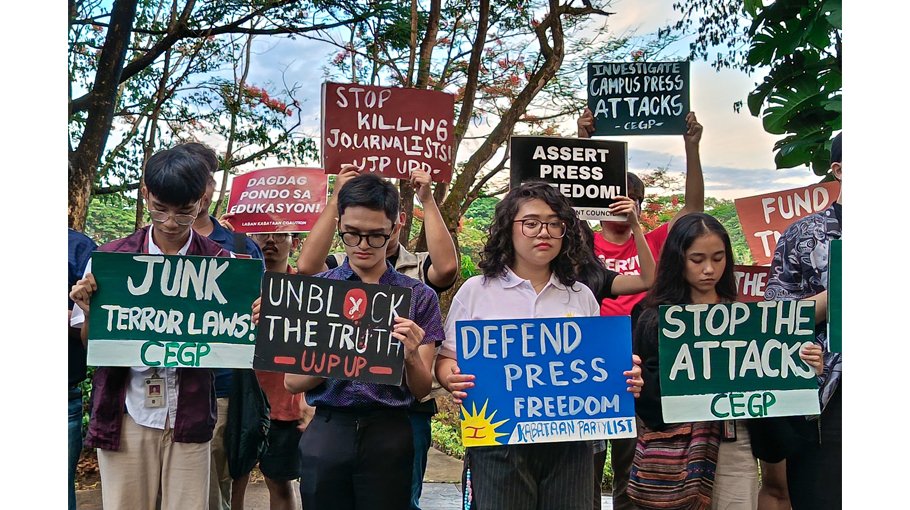The disinformation paradox gripping the Philippines

Ross Tapsell
The Philippines is being governed under a stark paradox — an administration built on disinformation is trying to mitigate disinformation. This contradiction exposes fundamental challenges facing democracy in the digital age.
For a decade, the Philippines has been ‘patient zero’ of debates around digital labour, disinformation and democracy. The Duterte administration institutionalised disinformation in the country, then paved the way for the Marcos family’s return to power in 2022 through an alliance with Sara Duterte, Rodrigo’s daughter. President Ferdinand Marcos Jr won the presidency through a rewriting of his family’s history on social media, among other vlogging and public sphere manipulation techniques. This interconnected digital infrastructure was an essential component of the successful Marcos–Duterte alliance.
But there has been a highly public and seemingly irreparable split in the alliance, with Rodrigo Duterte sent to the International Criminal Court (ICC) and the Philippines Senate debating an impeachment trial for his daughter, current Vice President Sara Duterte. A highly polarising political battle rages between these two camps, evident in the 2025 senatorial election results. Pro-Duterte online voices remain prominent on social media, including those who spread disinformation.
The Marcos administration has state funds and government levers of power to counter any opposition. But some observers I interviewed in the Philippines during the recent midterm elections worry that it underestimates the power of Duterte’s ‘air war’ operations and the fervent sentiment expressed by pro-Duterte supporters online. Researchers, NGOs, journalists and fact-checkers have tried unsuccessfully for years to counter Duterte’s disinformation network. Now, the Marcos administration is attempting to use the legal apparatus to do so.
In February 2025, 40 pro-Duterte bloggers were called to a House of Representatives hearing on ‘fake news’ and some of their accounts were taken down. Police operations have increased amid rising concerns about the use of the Cyber Libel law, which has a maximum 15-year jail term. Previously, controversial preacher and Duterte ally Apollo Quiboloy was arrested, his media network SMNI had its license revoked, making it digital only, and its Facebook pages were taken down for spreading ‘hatred or contempt’.
Throughout the campaign, the administration attempted to link Chinese disinformation to the Duterte opposition. In the lead up to polling day, the Palace spokesperson warned voters not to ‘sell the country by becoming a keyboard warrior whose only goal is to spread fake news’.
The Marcos Jr administration faces two fundamental problems — content and legitimacy. Rodrigo Duterte’s ICC arrest provides compelling content for his supporters, Sara Duterte’s presidential ambitions and for online engagement generally.
At the Duterte-led opposition rally in Manila, the well-choreographed performance was based around the so-called ‘tragedy’ of Rodrigo’s ICC arrest. It portrayed him as weak and a victim, sometimes even depicting Duterte as a Jesus-like figure who would rise again with enough prayers. Duterte’s younger daughter Kitty — an influential social media figure — gave an emotional speech. A children’s choir dressed in white performed alongside popular singers and actors. Supporters carried banners with the message ‘Bring Him Home’. The night concluded with the arrival of Sara Duterte who has previously claimed her father’s arrest helped reconcile the family and bring them closer together.
The Marcos Jr administration’s senatorial slate the following night focused on public policy initiatives. Officials claimed that trains were being built and that the economy was improving. They tried to counter the Duterte slate’s disinformation around drugs and crime with figures, facts and evidence. That strategy has never worked in the past, as any fact checker would testify. Compared to the Duterte event, nothing compelling or emotional emerged from the Marcos Jr administration rally. These public policy attempts seem uncharacteristic for an administration whose vacuous 2022 campaign was described by sociologist Nicole Curato as ‘good vibes and toxic positivity’. The Marcos Jr administration built itself through largely digital campaigns promoting forgiveness and a unified future. As the country enters a period of overt political polarisation, these narratives prove hollow. The defection of sister Imee Marcos to the Duterte team underscores that there is a lack of unity even within the family. The second problem for the Marcos Jr administration is legitimacy. While many of these Duterte networks deserve to either be taken down or subjected to greater scrutiny, especially those explicitly peddling fake news, the administration lacks the credibility to warn voters against disinformation.
Ross Tapsell is Senior Lecturer at the College of Asia and the Pacific, The Australian National University.
Source: East Asia Forum



